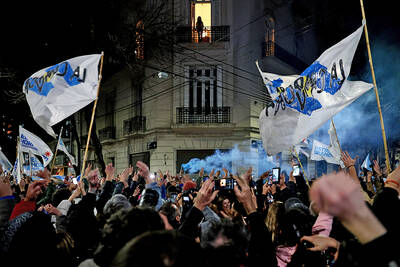Torrential rain caused an earthen dam to burst early yesterday, sending a wall of water crashing into a crowded neighborhood just outside Indonesia’s capital. The flood killed at least 50 people, left dozens missing and submerged hundreds of homes.
Rescuers — some using rubber rafts to pluck bodies from streets that were transformed into muddy rivers, littered with chairs, sandals and other debris — predicted the toll would climb.
“I’m devastated,” said Cholik, 21, crying as he sat next to the body of his 54-year-old mother.
His brother-in-law was also killed and his one-year-old niece was missing.
“I wasn’t home last night ... I should have been there to save them,” he said.
The massive dam, built decades ago under Dutch colonial rule, surrounded an artificial lake in Cirendeu, on the Jakarta’s southwestern edge. It collapsed just after 2am, when most people were sleeping, sending 2 million cubic meters of water gushing into homes.
Several residents said that it felt like they had been hit by a “mini-tsunami.”
Water levels were so high in some places that survivors waited on roof tops for rescuers. Telephone lines were toppled and cars swept away, some ending up in parks hundreds of meters from where they’d been parked.
“A flash flood came suddenly and was horrifying,” said Seto Mulyadi, adding that the heavy sludge smashed all the windows and doors on the ground floor of his house, while he, his wife and four children were sleeping upstairs.
Some people living near the dam said they heard sirens before the disaster, which followed a four-hour downpour. Others were caught completely off guard.
Health Ministry Crisis Center chief Rustam Pakaya said at least 50 people were killed and more than 400 houses submerged. Dozens more were missing.
A nine-year-old girl was found unconscious on top of one home after the waters receded, but she died on the way to the hospital, said rescuer Toni Suhartono, adding that the child’s parents and sister have not yet been accounted for.
A probe will be carried out to see what caused the disaster.
But Wahyu Hartono, a former official at the Ministry of Public Works Ministry, said the nearly 15m high dam has been poorly maintained in recent years because of budget shortfalls.
After four hours of heavy rain the spillway overflowed and then the base gave way.
“We need to find a way to take better care of these Dutch-era dams and dikes,” he said. “Otherwise, there will be more problems like this in the future.”
Seasonal downpours cause dozens of landslides and flash floods each year in Indonesia, a nation of 235 million, where many live in mountainous areas or near fertile plains, and Jakarta, home to 12 million, is rarely not immune.
More than 40 people were killed in the capital after rivers burst their banks two years ago. Critics said rampant overdevelopment, poor city planning and clogged drainage canals were partly to blame.

LANDMARK CASE: ‘Every night we were dragged to US soldiers and sexually abused. Every week we were forced to undergo venereal disease tests,’ a victim said More than 100 South Korean women who were forced to work as prostitutes for US soldiers stationed in the country have filed a landmark lawsuit accusing Washington of abuse, their lawyers said yesterday. Historians and activists say tens of thousands of South Korean women worked for state-sanctioned brothels from the 1950s to 1980s, serving US troops stationed in country to protect the South from North Korea. In 2022, South Korea’s top court ruled that the government had illegally “established, managed and operated” such brothels for the US military, ordering it to pay about 120 plaintiffs compensation. Last week, 117 victims

China on Monday announced its first ever sanctions against an individual Japanese lawmaker, targeting China-born Hei Seki for “spreading fallacies” on issues such as Taiwan, Hong Kong and disputed islands, prompting a protest from Tokyo. Beijing has an ongoing spat with Tokyo over islands in the East China Sea claimed by both countries, and considers foreign criticism on sensitive political topics to be acts of interference. Seki, a naturalised Japanese citizen, “spread false information, colluded with Japanese anti-China forces, and wantonly attacked and smeared China”, foreign ministry spokesman Lin Jian told reporters on Monday. “For his own selfish interests, (Seki)

Argentine President Javier Milei on Sunday vowed to “accelerate” his libertarian reforms after a crushing defeat in Buenos Aires provincial elections. The 54-year-old economist has slashed public spending, dismissed tens of thousands of public employees and led a major deregulation drive since taking office in December 2023. He acknowledged his party’s “clear defeat” by the center-left Peronist movement in the elections to the legislature of Buenos Aires province, the country’s economic powerhouse. A deflated-sounding Milei admitted to unspecified “mistakes” which he vowed to “correct,” but said he would not be swayed “one millimeter” from his reform agenda. “We will deepen and accelerate it,” he

Japan yesterday heralded the coming-of-age of Japanese Prince Hisahito with an elaborate ceremony at the Imperial Palace, where a succession crisis is brewing. The nephew of Japanese Emperor Naruhito, Hisahito received a black silk-and-lacquer crown at the ceremony, which marks the beginning of his royal adult life. “Thank you very much for bestowing the crown today at the coming-of-age ceremony,” Hisahito said. “I will fulfill my duties, being aware of my responsibilities as an adult member of the imperial family.” Although the emperor has a daughter — Princess Aiko — the 23-year-old has been sidelined by the royal family’s male-only